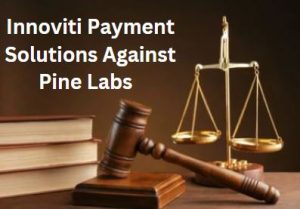Introduction
A Patent infringement suit was filed by Innoviti Payment Solutions (“the Plaintiff”) regarding its point-of-sale (POS) terminal technology against Pine Labs (“the Defendant”) in the Addl. City Civil and Sessions Court wherein an interim injunction was granted in their favour. Thereafter, the Defendant moved the matter to the Hon’ble Karnataka High Court challenging the allegations of patent infringement and validity of generic patent grant and filed its counterclaim for revocation of the Plaintiff’s patent, where an order vacating the interim injunction against Pine Labs was passed by the Hon’ble High Court of Karnataka stating that the Plaintiff had failed to establish an act of infringement.
Vide the ex-parte injunction granted by the Hon’ble Addl. City Civil and Sessions Court on 17th July 2019, the Defendant was restrained from manufacturing, selling, distributing, advertising, exporting, offering for sale, procuring and dealing with this technology through its Plutus Smart or any other device in India.
The matter was transferred to the High Court of Karnataka wherein the Plaintiff sought a decree of permanent injunction restraining the defendant and all others acting on their behalf from using/manufacturing/selling distributing, advertising, exporting, offering for sale, procuring and dealing and dealing, any other manner directly or indirectly, the technology covered under Suit Patent bearing no. 309274 with the product Plutus Smart or any other device with a communication verification system capable of generating a transaction specific unique QR-Code on Point of Sale (POS) terminal along with rendition of accounts of profits, delivery up, seizure/forfeiture of infringing material and damages.
Submissions on behalf of the Plaintiff
- That the suit patent comprises of an invention which is the Communication Verification System (CVS) capable of generating a transaction specific unique QR code on a Point of Sale (POS) terminal. It was submitted that the suit patent was patentable and the Plaintiff had rightfully obtained a suit patent from the Indian Patent Office in the year 2019, and the Defendant had committed infringement of their suit patent.
- That the suit patent is a novel, new invention and comprises inventive step as per the definition of ‘new invention’ defined under Section 2(1)(l) of the Patents Act, 1970 (“the Act”) and ‘inventive step’ under Section 2(1) (ja) of the Act.
- That the Defendant has relied on the judgement of Aloys Wobben v. Yogesh Mehra[1] where the Hon’ble Supreme Court observed that a counter claim filed before the High Court and a revocation petition before the IPAB cannot be availed simultaneously under Section 64(1) of the Act.
- That the suit patent does not fall under Section 3(k) of the Act as a computer program is not a mere computer instruction being executed in a sequential manner. The flow of invention is dependant on the verification of the communication request and the QR code generated at the terminal device and shall never be executed in a pre-determined sequential manner. Further, the counsel referred to Section 4.5.4 of the Guidelines for Examination of Computer Related Inventions (CRIs)[2] which defines “computer program” and submits that patent does not fall under Section 3(k) of the Act as the main novel invention is implemented in the form of a software.
Submissions on behalf of the Defendant
- That the suit patent is invalid and, accordingly, a counter claim for revocation is sought by the Defendant under Section 64(1) of the Act.
- That there is absolutely no novelty in the suit patent under Section 2(1)(l) and the suit patent lacks any inventive step under Section 2(1)(ja). Further, since prior art documents including earlier patents existing from before the Plaintiff applied for the patent were being used by the State Bank of India, Bharat QR code, Axis Bank along with multiple US patents, the same is liable to be revoked.
- That the suit patent is statutorily non-patentable under Section 3(k) of the Act. The subject matter they are seeking to protect is a method/system/device for carrying out transaction in a network by authenticating the user using a security code (QR) and then processing the transaction request. The same is nothing but a software having computer programming instructions.
- That the National Payment Corporation of India (NPCI) has also filed post-grant opposition to the suit patent and, thus, the suit patent is liable to be revoked.
Order
The Hon’ble Karnataka High Court held that, in absence of any material to either establish that the CVS of the defendant or its functionality or working is identical or similar to the CVS/Server of the plaintiff, the plaintiff has failed to make out a prima facie case for grant of temporary injunction restraining infringement and is, consequently, not entitled to an order of temporary injunction. It was observed that the suit patent does not include or cover the POS machine and is restricted and limited to only the CVS/Server. Therefore, the order of the temporary injunction passed earlier in favour of the plaintiff against the defendants stands vacated.
Author: Sarah Wilson, in case of any queries please contact/write back to us via email to chhavi@khuranaandkhurana.com or at Khurana & Khurana, Advocates and IP Attorney.
[1] Dr. Aloys Wobben v. Yogesh Mehra, (2014) 15 SCC 360.
[2]https://ipindia.gov.in/writereaddata/Portal/IPOGuidelinesManuals/1_86_1_Revised__Guidelines_for_Examination_of_Computer-related_Inventions_CRI__.pdf




